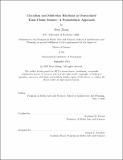Circadian and Multi-day Rhythms in Generalized Tonic-Clonic Seizure: A Probabilistic Approach
Author(s)
Zhang, Boyu
DownloadThesis PDF (17.75Mb)
Advisor
Picard, Rosalind W.
Terms of use
Metadata
Show full item recordAbstract
Epilepsy is a chronic neurological disorder characterized by recurrent seizures that affect more than 50 million people worldwide, representing approximately 0.6\% of the global population. This condition poses significant public health challenges, with a heightened risk of premature mortality. Underdiagnosis and undertreatment remain pervasive, particularly in low- and middle-income countries.
Studies have discovered that seizure occurrences are phase-locking to subject-specific circadian and multi-day rhythms in human physiological signals. Also, various types of epilepsy have distinctive timing patterns with respect to sleep-wake cycles. However, it remains inconclusive how sleep parameters, non-invasive ambulatory physiological signals, and seizure occurrences are quantitatively related.
We first conduct an observational study on the association between sleep parameters, including duration, efficiency, fragmentation, and regularity, and generalized tonic-clonic seizure (GTCS) occurrences on the next day. We then conduct retrospective analyses of GTCS events phase-locking to rhythms in wrist electrodermal activity (EDA), validating previous claims. Ambulatory sleep-wake cycles and EDA recorded by smart wristbands from more than 1,000 patients diagnosed with GTCS are analyzed. GTCS events are detected by an FDA-cleared algorithm on the wristband.
Date issued
2023-09Department
Program in Media Arts and Sciences (Massachusetts Institute of Technology)Publisher
Massachusetts Institute of Technology